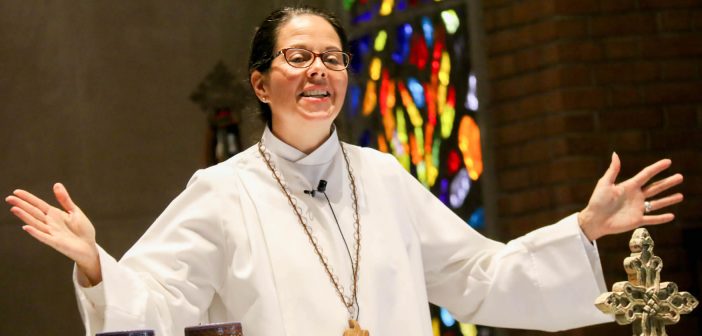Celebrate your new pastor. Know that your new pastor continues a tradition of women in ministry going back to biblical times. Do all that you typically do to welcome a male pastor, including praying for her daily. Give her a generous opportunity to fulfill her ministry, and let any judgment be by the biblical standard of fruitfulness.
Treat her as your pastor first. Avoid putting gender first in conversations about her. Talk about her as you would a new male pastor. Use the proper title, or ask what she would like to be called. Avoid using terms of affection, and resist language such as “woman pastor” or “lady pastor.” And do not lower compensation due to gender or assumptions of other sources of income or benefits coverage.
She will bring unique gifts for ministry. Learn your pastor’s gifts rather than making gender assumptions. She has both strengths and limitations, just as your male pastors had. Most of your delights and objections will not be gender-based. Respect different types of leadership. Some male pastors are not very good. The same goes for women. If she isn’t serving your church well, it is not because she’s a woman.
Expect some resistance but avoid making very much of it. Expect some push back, especially if this is a new experience for your church. A few may leave, but far more are likely to join. Resist assuming the worst and making too much of it. Clergywomen are common in today’s world. Avoid allowing negative voices to dominate. Ask people to keep an open mind. Most resistance is based on the unknown.
Avoid stereotyping and assumptions. Keep pastoral expectations as before. Don’t assume she will be good with children but not finance. Don’t expect her to bring treats for meetings. Women often have family responsibilities but so do many men. Resist asking about her personal life, relationships, or family plans that you would not ask a male pastor.
Some things may not fit. Be open to repainting the office and replacing the pastor’s chair if it no longer fits the occupant. The pulpit may need adjustment for height, and make sure the sound system works for a female voice, especially if it’s high or soft.
Make sure there is a trusted feedback group. Your new pastor needs regular honest feedback from those committed to her success. Assure that someone is asking your new pastor how things are going and listen. A trusted group that listens makes the pastor more open to receiving feedback she needs to improve.
Avoid references to appearance. Avoid making comments about her size, shape, or appearance. How she dresses or does her hair should not be a topic of conversation. Avoid such comments that would never be made to a male pastor.
I have had more comments about my hair style than I can count, including “I am so glad you cut your hair; your last hair style was distracting when you preached.”
Pay attention to boundary issues. Take seriously any concerns a female pastor expresses about sexual harassment or unwanted actions involving staff, parishioners, or others. All clergywomen encounter such situations at some point. Train church leadership in how to recognize when harassment or sexism is at play. Members need reminding that “If you didn’t say it to a male pastor, don’t say it to a female pastor. If you didn’t kiss your male pastor, don’t do it now.”
I’m the third female pastor, and I have no sense that people still object to having a female pastor, but they do still say inappropriate things!
The all purpose question to remember: “Would you honestly ask (say, criticize) this if the pastor were a man? If so, okay. If not, drop it.”
Clergywomen graduates of Lewis Fellows, a Lewis Center leadership development program for young clergy, provided the content for this resource.
A companion Lewis Center resource is “Why Women Are Clergy.”




